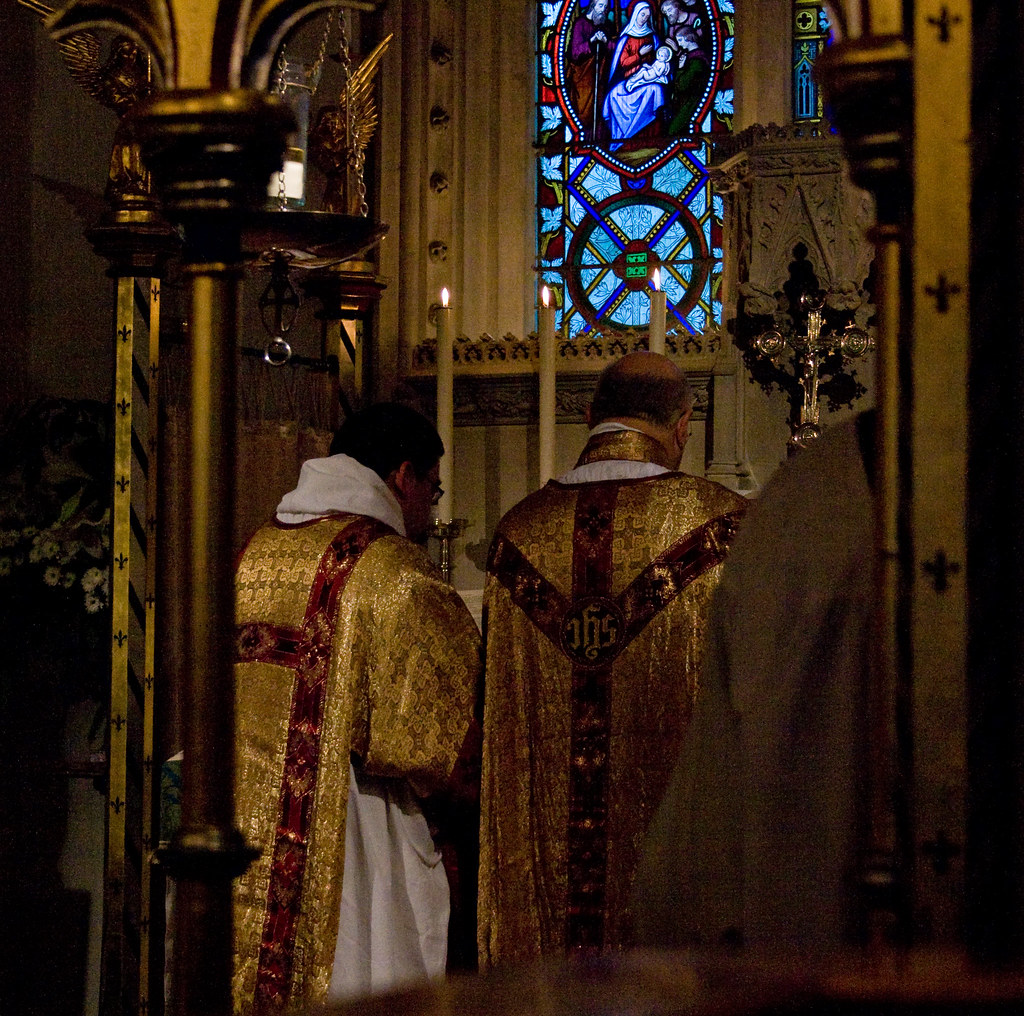
Mass at the Cathedral was of course not the Ascension. When I got back from London I had the choice of going to the Ascension at Reading (sung, at 7.20pm) or St Birinus, Dorchester on Thames (Solemn, 7.30pm). I went to Dorchester - in fact I gave Fr John Saward, who preached, a lift - and so was able to witness a Solemn Mass there for the second time.

St Birinus was packed, and the music, provided by Mr Andrew Knowles, was superb. It was mostly Hyden, in recognition of his 200th Anniversary.
The Installation was an impressive service. The great cathedral was packed. The Latin Mass Society was allocated one ticket, a first for an event of this kind, and a sign of our growing acceptance as part of the Catholic mainstream. The service ended with the Te Deum, sung antiphonally between the choir - singing a polyphonic setting - and 'all', singing the simple tone of the chant setting. The choir is superb but I have my doubts about this arrangement; I think the congregation would have sung more confidently if the whole thing had been sung with the chant setting, which repeats themes and makes overall musical sense.
In my part of the church - a side chapel - we were sitting on benches which didn't have kneelers. At the canon I knelt down, but the Catholic great and the good who were with me did not. An unwillingness to kneel on a marble floor may be the least of the problems of the Catholic laity in England and Wales, but it is a representive one. If they won't submit to any discomfort for Our Lord, how much support are they going to give Archbishop Nichols when the going gets tough?
At the canon I knelt down, but the Catholic great and the good who were with me did not.The astounding arrogance of the "Catholic elite" - a refusal to acknowledge someone greater is always a sign of inner pride and is exactly the reason why Lucifer was thrown out of Heaven.
ReplyDeleteGod help us all!
Many people now don't kneel or genuflect,sometimes a bow is enough and talking is found in many churches.
ReplyDeleteHowever, I am interested in your comment that the L.M.S. is accepted and wonder if this is as good as it seems and what it means ? Is it not,rather, a sign that the New Catholic church is more and more like the Church of England with an acceptance and inclusion of almost everyone as long as doctrine and truth are not talked about and nobody tells anyone else that they are wrong ? Is it good to be accepted as part of that establishment - I am not sure ? Alan Robinson
Dear Alan,
ReplyDeleteI understand your concern but whether we are accepted by the establishment - in the rather minor and symbolic ways we are - is up to the establishment, not up to us. We have to have confidence in what we are doing, and hope it rubs off on the people who shoulders we are rubbing, as it were.
The objection they had in the past was the Mass. If they are dropping this objection - as they have to, after the Motu Proprio - this is a chance for the Mass to have the effect on the Church as a whole the Holy Father would like.
I agree completely, the Mass can be a converting and evangelistic tool, but I am anxious that the big problems of doctrine are not forgotten: the uniqueness of the Church, ecumenism, Religious liberty (Church and State questions), as well as the basics of the classic catechisms.It is easy to "enjoy" the availability of the liturgy and ignore the vastness of the doctrinal crisis and confusion. I can remember meeting a couple at a traditional Mass (NOT L.M.S.) who had no regard for or belief in the doctrine of the church on the use of marriage and yet were second to none in their love of the traditional liturgy.But then so was Henry VIII. We live in puzzling times. Thanks for your reply.
ReplyDeleteAlan Robinson